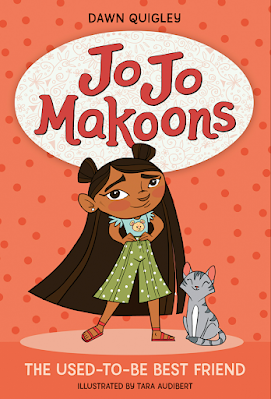HIGHLY RECOMMENDED:
Jo Jo Makoons, The Used-to-Be Best Friend
Written by Dawn Quigley (Citizen, Turtle Mountain Band of Ojibwe)
Illustrated by Tara Audibert (Wolastoqey)
Published by Heartdrum
Publication Year: 2021
Reviewed by Debbie Reese
Review Status: Highly Recommended
****
Today's Short and Sweet Rec is for Dawn Quigley's Jo Jo Makoons, The Used-to-Be Best Friend. For starters, here's the description of the book (from the publisher):
Hello/Boozhoo—meet Jo Jo Makoons! Full of pride, joy, and plenty of humor, this first book in an all-new chapter book series by Dawn Quigley celebrates a spunky young Ojibwe girl who loves who she is.
Jo Jo Makoons Azure is a spirited seven-year-old who moves through the world a little differently than anyone else on her Ojibwe reservation. It always seems like her mom, her kokum (grandma), and her teacher have a lot to learn—about how good Jo Jo is at cleaning up, what makes a good rhyme, and what it means to be friendly.
Even though Jo Jo loves her #1 best friend Mimi (who is a cat), she’s worried that she needs to figure out how to make more friends. Because Fern, her best friend at school, may not want to be friends anymore…
And now, the Short and Sweet Rec:
First: It is a first! By that, I mean that it is the first Native-authored early chapter book series that I know of! If you have children, you know what these "early" books are about. They're the ones that kids who are starting to read on their own look for, and then hold close to their hearts because of the sense of accomplishment, confidence, and joy that independent reading delivers. What sets this one apart from all others is that it is about an Ojibwe kid. I've seen far too many early reader books with stereotypical words and illustrations of Native people. Books like that hurt a Native reader and they misinform a non-Native reader. They do a lot of harm. But this book... it makes my heart soar! We've got an Ojibwe girl in the present day, living her life, which leads to my second point.
Second: Native children who grow up with their Native communities say things. They do things. They know things. All those things are unique to their specific community. In Jo Jo Makoons you will see Ojibwe words that Jo Jo uses, just because they're part of her life. Instead of grandpa, she says Mooshoom. And right there on page 3 when you first see "Mooshoom" you also get Jo Jo, talking to the reader in the way that people talk to each other (p. 3):
Do you wanna know what mooshoom means? It means "grandpa" in the Michif language.
Just before that passage, Jo Jo tells readers "My name is Jo Jo Makoons Azure." But she also asks readers if they want to know how to say that sentence, in her language:
Try saying: "Jo Jo Makoons Azure nindizhinikaaz."
Jo Jo acknowledges that some will feel challenged by the "big last word" and reminds them that they learned how to say Tyrannosaurus rex, and that they can also learn how to say nindizhinikaaz.
Third: On page 6, we read that Jo Jo's mooshoom died the year before and that her kokum (grandmother) moved in with them. That is very common within Native communities. Grandparents are a significant presence in the life of Native children--and Jo Jo's kokum is a big part of her life.
Fourth: This last is, perhaps, coincidental. When I first read Jo Jo Makoons (I've been recommending it in just about every workshop and lecture I've done this year), the final paragraphs of chapter one did not stand out but they sure do now! In them, Jo Jo hears her mom and kokum talking about Jo Jo's cat needing shots. Jo Jo remembers back to the summer before, when she needed shots. Her kokum told her (p. 9):
My girl, shots help you to be healthy. There are many sicknesses out there, and shots give good protection.
Obviously, that stands out to me now because across the U.S., children are getting shots to protect them from COVID. I hope that little bit there helps kids know these shots are necessary for their well-being. I don't know what Quigley intended when she wrote that passage but it strikes me as more of the care that permeates the world of Jo Jo and her family. It feels a bit like concentric circles of care.
As I write this review, newspapers are filled with reports of parents challenging books that make them uncomfortable. At present we are seeing a terrific growth of diversity in what is being published and embraced by educators, librarians, and readers. Diversity feels like a threat, to those who are unsettled by it, but I hope that books like Jo Jo Makoons -- with the care infused throughout it -- can help those parents see that care of each other, and care of community, is central to the well-being of everyone.
Get a copy! Feel that care. And share it with others.
______
*A Short and Sweet Rec is not an in-depth analysis. It is our strategy to tell you that we recommend a book we have read. We will definitely refer to it in book chapters and articles we write, and in presentations we do. Our Short and Sweet Recs include four reasons why we recommend the book.

